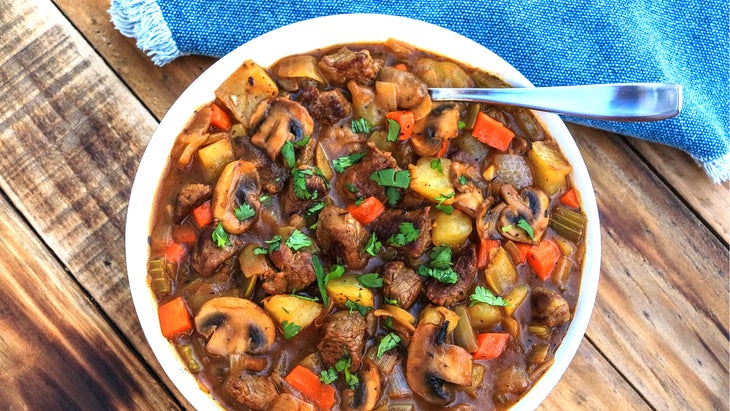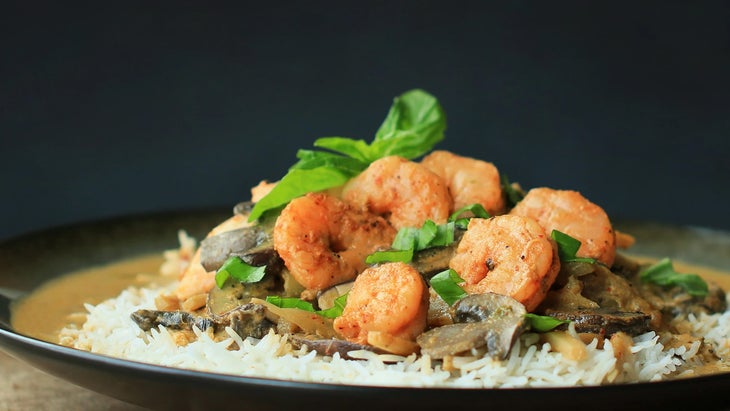Products You May Like
Making restaurant-quality dehydrated food is incredibly difficult. There are limits to the types of foods you can dehydrate, especially when it comes to fat content. Sucking all of the water out of proteins does terrible things to texture. Seasoning a dehydrated food pouch so that it’s perfectly salted and acidified after it’s been reconstituted? You’re more likely to get a permit for the John Muir Trail.
In recent years, the sheer number of brands and variety of cuisines on offer for hungry backpackers has grown exponentially. No longer must we choose between oversalted stroganoff and gummy mac n’ cheese. Still, even the best brands struggle to pull off a reconstituted meal now and then, and the basic rules of dehydration and freeze-drying seem to have their limits, no matter how good the ingredients are. That was, until Stowaway Gourmet came along in 2020.

The small-scale Tillamook, Oregon-based company has completely changed our understanding of what is possible in a backpacking meal, with dishes like Lamb Bourguignon and Bison Beer Black Bean Chili. The best way we can describe the difference: The taste of instant coffee vs freshly-ground pour-over. (Wondering if we’ve done our research? Check out our Pouch Wars column, where Backpacker categorically taste-tests and ranks dehydrated backpacking food).
One of the most impressive things about Stowaway’s pouches is how well they retain texture, especially when it comes to proteins. Shrimp stays plump and juicy. Chicken stays rich and fatty. Salmon—which brands almost never use in dehydrated meals because of its cost and texture—is miraculously tender.
Forty-eight-year-old owner Dan West is tight-lipped about his freeze-drying process, other than to say that every aspect is proprietary: “There’s a history of freeze-drying that is optimized around large industrial operations, but they are missing a lot in terms of the work it takes to make something enjoyable. We are questioning and challenging every way that we possibly can within the constraints of science to make better freeze-dried food.”
The range of cuisines that Stowaway dabbles in is considerable: France, Italy, Mexico, India, Thailand, Russia, and Japan are all accounted for, with more authenticity than can be said of most other brands. West, who spent a quarter of his adult life living in Asia, dove deep into the food cultures and culinary secrets of the cities he lived and worked in. Miso Salmon Okayu, a salmon and tofu-filled Japanese rice porridge that works well for just about every meal, is simmered with daikon, miso, fresh ginger, kombu, and bonito flakes. A Thai curry lists the unabridged essentials—lemongrass, shallot, Thai chiles, shrimp paste, galangal, and Makrut lime leaf—among its ingredients.

Part of Stowaway’s success is owed to its willingness to suffer through hours of kitchen experiments with atypical ingredients. “Boar is a complete nightmare to work with,” West says. “We take a side of boar bacon and almost have to take it entirely apart to make it appropriate for the customers. You have to become an engineer, there’s just no other way to do it.”
Whatever Stowaway is doing in their reinvented freeze-dried laboratory, it’s working. We’ve never tried a backpacking pasta with as much richness, texture, and umami as the brand’s La Pasta Nostra, a rich stew of tomato, anchovy, mushrooms, and Italian cheeses. Nor have we had a Southwest stew as belly-warming, complex, and balanced as Stowaway’s chicken and hominy Las Pollos Hermanas. When you’d rather eat a dehydrated pouch meal than feast on a freshly-grilled burger during a resupply run, you know something is different.
What about that price tag? At around $16 a pop, Stowaway’s pouches are a dollar or two more than comparable boutique pouch meal brands like Gastro Gnome, Fernweh Food Co., and Farm to Summit. If your standard is a $10 Mountain House meal, there’s definitely sticker shock, especially if you are gearing up for a longer trip. And if taste isn’t a major factor for you, but rather caloric value and protein levels, then Stowaway probably isn’t worth the splurge. (Although the brand does tend to have solid numbers for both, with 500-700 calories and 25-49 grams of protein per pouch).
But if you, like us, have always felt that dehydrated food malaise shouldn’t ruin a backpacking trip in the 21st century, then Stowaway is worth a try. And, with a high bar like the one this brand is setting, we hope other backpacking meal companies will rise to meet the challenge.
